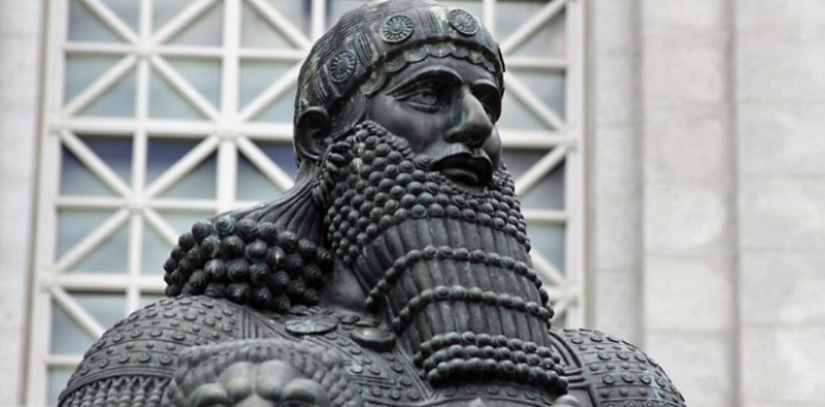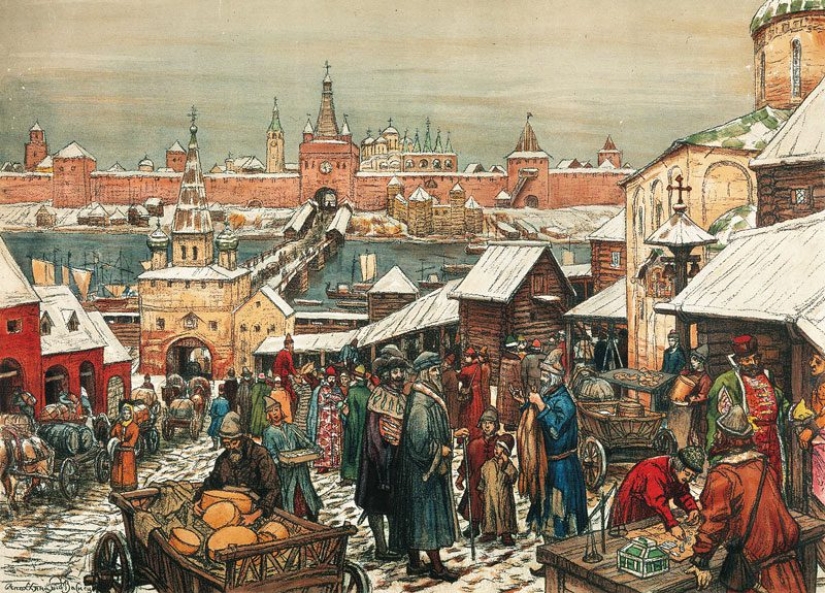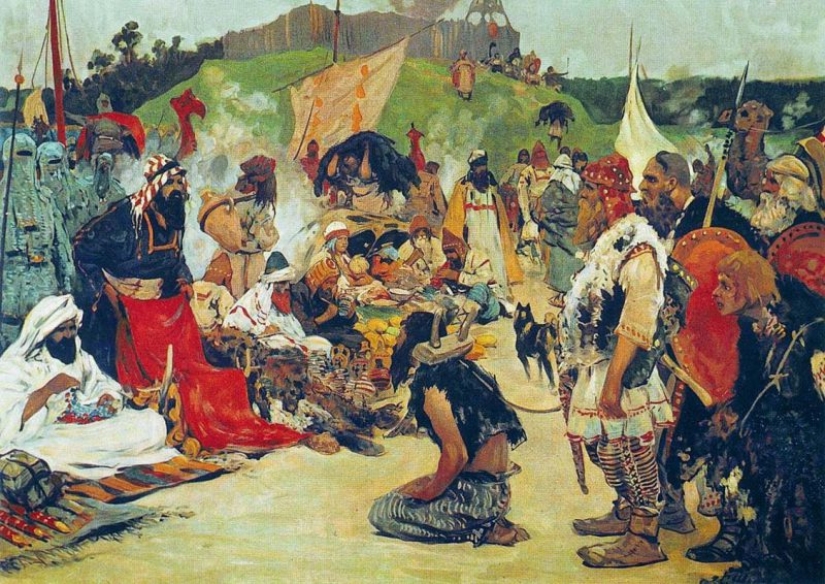How they fought with dishonest merchants in the old days
Categories: Culture | History | Nations | Society | World
By Pictolic https://pictolic.com/article/how-they-fought-with-dishonest-merchants-in-the-old-days.htmlIn the modern world, where there are consumer protection societies and many other regulatory authorities, the buyer is somehow protected from fraud by the seller. There were ways to protect customers in the good old days. They were diverse and often unusual. But whether they were effective, it is quite difficult to judge today.

Now, when trade is gradually moving to the Internet, it is not so easy to find justice for unscrupulous traders even with the help of official services. Therefore, there are a number of rules for buying products online: refusal of prepayment, careful inspection of the goods, keeping the CVV code of the bank card secret. But, despite all the measures taken, the number of deceived buyers is growing every year.
Centuries ago, there were their own trading rules, security measures and their own ways of punishing scammers. Let's get acquainted with the old ways of protecting the rights of the buyer — maybe something will turn out to be used in the modern world.
1. The Laws of Manu, India
For honest traders in ancient India, the main set of business rules was the code of laws of Manu-smriti. It was believed that in ancient times these rules were laid down by the great sage Manu, and two thousand years ago, learned brahmins wrote down his thoughts from memory. We know these rules thanks to the British traveler William Jones, who found ancient records and translated them at the end of the XVIII century.
The main problem of the extant sources of Manu-smriti is their dubious reliability. There are many different versions of these laws, so one cannot rely on their complete originality in any case. Despite this, there are general rules in all versions of the code, most likely related to the original.
First of all, the laws of Manu recommend making transactions only in the presence of witnesses. A buyer who accidentally bought a stolen item was offered to return it to the owner as soon as possible — in this case, he was released from punishment. Among all the types of deception of buyers described in the source, the most serious among the Hindus was the sale of non-seed grain under the guise of seed. This also included the sale of grain extracted from the ground after planting (it turns out, it happened like this).

Even at that time, there was a return of the goods, but this option had to be negotiated during the transaction. If the buyer did not like the product, he could return it within 10 days and get back his money or things given in return. Here is such an ancient guarantee.
2. The Code of Hammurabi, Babylon

The Babylonian kingdom existed 4 thousand years ago on the territory of modern Iraq. Despite the fact that it was a very long time ago, more is known about the life and customs of the Babylonians than about the life of some European countries in the XVIII-XIX century. Thanks to cuneiform writing on clay tablets, not only literary works, such as the Epic of Gilgamesh, but also collections of the laws of King Hammurabi have come down to us.
The code of laws of Hammurabi covered all aspects of human activity in the kingdom, from trade and court, to medicine. The wise ruler also paid a lot of attention to the issues of fraud in trade. As in India was recommended to make transactions in the presence of witnesses — from 2 to 12. The more serious the amount was, the more people had to be present at the sale.
The deal was sealed by an oath to King Hammurabi himself or to the supreme deity Marduk. Thus, those who violated the rules of fair trade became both an enemy of the tsar and a blasphemer. If it was necessary, they drew up a contract on a clay tablet. At the same time, two-layer clay products were used, which protected the document from forgery.
Today, archaeologists and historians have many such tablets at their disposal, where not only the places of transactions and the price of the issue are indicated, but also the names of the seller and the buyer. For example, a slave in the city of Lars costs 13 shekels of silver, which corresponds to 156 modern grams. It seems that this is a normal price for an adult, able-bodied man.
3. The Rules of Rabbi Joseph, Palestine
No one will argue with the fact that Jews know a lot about trade. This people with a complicated history has always lived according to strict canons, subordinate to religious texts, on the basis of which rules for anything were created. In the XVI century, the wise rabbi Joseph Karo from Safed compiled the code "Shulchan aruch" ("Set table"), which contained thousands of paragraphs.
The work of Rabbi Joseph contained instructions regulating all aspects of Jewish life, including trade. The code stated that if the seller took a deposit or allowed the buyer to leave his mark on the goods, there was no way back for either one or the other party.
The punishment for violating this rule seems ridiculous today — the curse of the rabbinical court awaited the person who changed his mind. But it should be remembered that in the Middle Ages, a person cursed by the rabbis became practically an outcast of his people, who ceased to exist both for the state and for his family. Therefore, we tried our best to adhere to the rules.
When making an important transaction, the seller and the buyer had to call several Jewish witnesses and, for some reason, one Gentile. If no one was nearby, then one rabbi could replace the council. The word of a clergyman was valued incredibly highly, because the authority of the rabbi was indestructible.
4. The Koran, the countries of the Islamic world

The holy book of Muslims clearly states that on the Day of Judgment, crooks and traitors will be resurrected with a special brand on their body, by which everyone will be able to recognize the scoundrel. The faithful were very afraid of this, but for the fearless, more tangible executions were provided.
In the Koran there is a mention of a nomadic Arab tribe of Midianites. These people did not lead a very pious lifestyle — they were engaged in robbing caravans, stealing from houses and shops, as well as hanging customers with specially made hollow weights for scales.
The Prophet Shuaib tried to reason with the wicked, but they first mocked him, and then began to threaten him with murder. Then Allah had to intervene, who sent a strong earthquake to the villages of the Midianites, which killed the villains right in their homes. The unclean Aikit tribe also suffered. Some of the people of this people joined the prophet and were saved, and the rest were killed by the drought and the heavenly fire.
5. Trading rules in Russia

After Russia adopted Christianity, trading platforms-markets and guest houses, began to build temples. For example, in Kiev of the X century, there were about 40 churches in 8 markets. A princely flag and a cross were installed near the market. This meant that the trading place was protected by both God and the state, and violators would be severely punished.
In the Russian principalities, it was not customary to conclude written contracts and everything was limited to oral agreements. Of course, it was quite easy to break them, citing, for example, poor hearing or misunderstanding. So the carelessness in trade transactions that is inherent in us today has been inherited from our ancestors. We are also used to taking sellers at their word and freely interpreting the purchase and sale agreements in our favor.

Look at these merchants from different countries of the world — how much dignity and at the same time benevolence in their faces. Despite this, when dealing with them, it is better to leave emotions aside and be more attentive.
Keywords: East | Money | Jews | Purchase | Market | Transaction | Court | Trade
Post News ArticleRecent articles

It's high time to admit that this whole hipster idea has gone too far. The concept has become so popular that even restaurants have ...

There is a perception that people only use 10% of their brain potential. But the heroes of our review, apparently, found a way to ...
Related articles

Now we can keep our savings in a bank or, if we don't trust financial institutions, put them in a safe and keep them at home. And ...

Millions of people around the world buy lottery tickets in the hope of winning a happy life. They dream of luxury cars, luxury ...

Franz Stangl was arrested on a grand scale. Several police cars and armored vehicles with machine guns, raising dust, surrounded a ...

New Year's is a time to surprise and delight loved ones not only with gifts but also with a unique presentation of the holiday ...